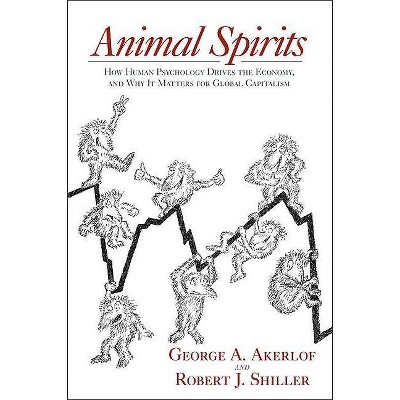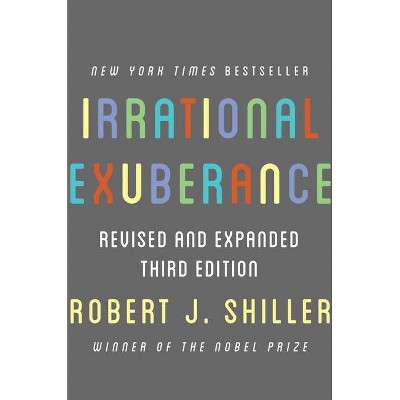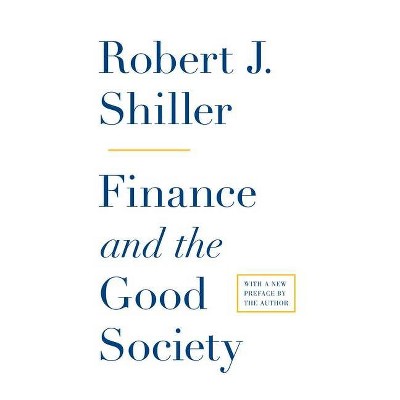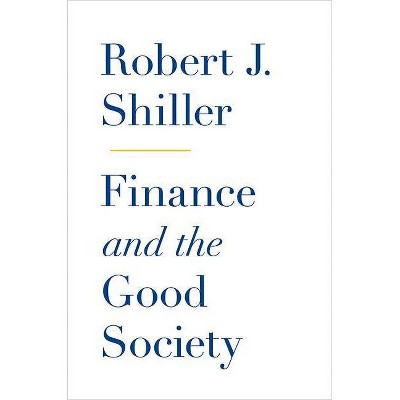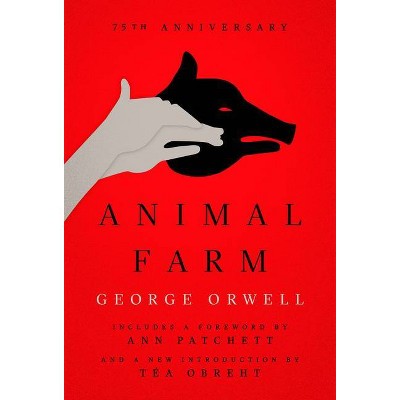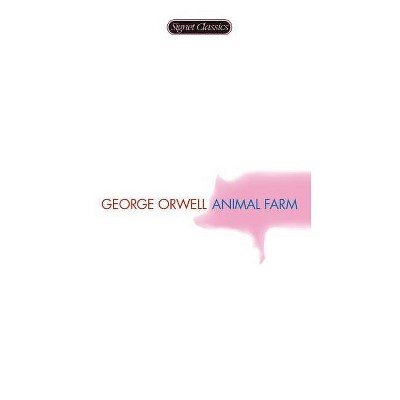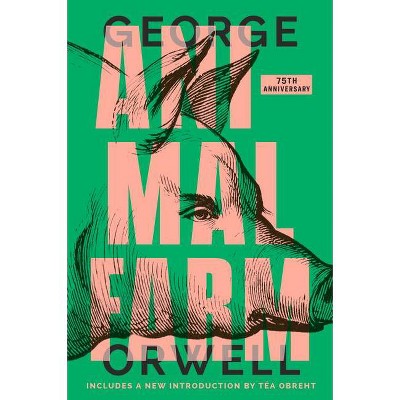Animal Spirits - by George A Akerlof & Robert J Shiller (Paperback)
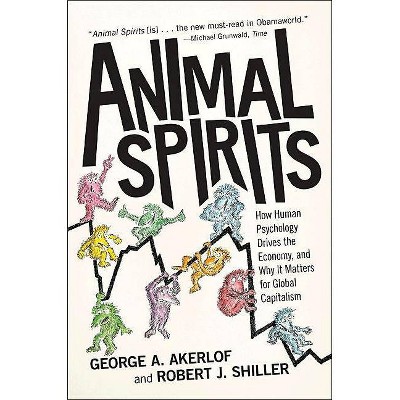
Similar Products
Products of same category from the store
AllProduct info
<p/><br></br><p><b> About the Book </b></p></br></br>This text provides a picture of how a capitalist economy works, especially at the macro level. It considers eight questions about the working of the economy. This provides the background that is necessary to take on other questions about macroeconomic policy, finance, bankruptcy law, and others, and to begin to answer them.<p/><br></br><p><b> Book Synopsis </b></p></br></br><p><b>From acclaimed economists George Akerlof and Robert Shiller, the case for why government is needed to restore confidence in the economy</b> <p/>The global financial crisis has made it painfully clear that powerful psychological forces are imperiling the wealth of nations today. From blind faith in ever-rising housing prices to plummeting confidence in capital markets, animal spirits are driving financial events worldwide. In this book, acclaimed economists George Akerlof and Robert Shiller challenge the economic wisdom that got us into this mess, and put forward a bold new vision that will transform economics and restore prosperity. <p/>Akerlof and Shiller reassert the necessity of an active government role in economic policymaking by recovering the idea of animal spirits, a term John Maynard Keynes used to describe the gloom and despondence that led to the Great Depression and the changing psychology that accompanied recovery. Like Keynes, Akerlof and Shiller know that managing these animal spirits requires the steady hand of government--simply allowing markets to work won't do it. In rebuilding the case for a more robust, behaviorally informed Keynesianism, they detail the most pervasive effects of animal spirits in contemporary economic life--such as confidence, fear, bad faith, corruption, a concern for fairness, and the stories we tell ourselves about our economic fortunes--and show how Reaganomics, Thatcherism, and the rational expectations revolution failed to account for them. <p/><i>Animal Spirits</i> offers a road map for reversing the financial misfortunes besetting us today. Read it and learn how leaders can channel animal spirits--the powerful forces of human psychology that are afoot in the world economy today. In a new preface, they describe why our economic troubles may linger for some time--unless we are prepared to take further, decisive action.</p><p/><br></br><p><b> From the Back Cover </b></p></br></br><p>"This book is a sorely needed corrective. <i>Animal Spirits</i> is an important--maybe even a decisive--contribution at a difficult juncture in macroeconomic theory."<b>--Robert M. Solow, Nobel Prize-winning economist</b></p><p>"This book is dynamite. It is a powerful, cogent, and convincing call for a fundamental reevaluation of basic economic principles. It presents a refreshingly new understanding of important economic phenomena that standard economic theory has been unable to explain convincingly. <i>Animal Spirits</i> should help set in motion an intellectual revolution that will change the way we think about economic depressions, unemployment, poverty, financial crises, real estate swings, and much more."<b>--Dennis J. Snower, president of the Kiel Institute for the World Economy</b></p><p>"<i>Animal Spirits</i> makes a very timely and significant contribution to the development of a new dominant paradigm for economics that acknowledges the imperfections of human decision making, a need which the panic in financial markets makes all too apparent. I am not aware of any other book like this one."<b>--Diane Coyle, author of <i>The Soulful Science: What Economists Really Do and Why It Matters</i></b></p><p>"Akerlof and Shiller explore how animal spirits contribute to the performance of the macroeconomy. The range of issues they cover is broad, including the business cycle, inflation and unemployment, the swings in financial markets and real estate, the existence of poverty, and the way monetary policy works. This book is provocative and persuasive."<b>--George L. Perry, Brookings Institution</b></p><p/><br></br><p><b> Review Quotes </b></p></br></br><br><i>Animal Spirits</i> is exceptional in showing how economics can be accessible and relevant in dealing with this awesome challenge.-- "Irish Times"<br><br><i>Animal Spirits</i> offers a road map for reversing the financial misfortunes besetting us today. Read it and learn how leaders can channel animal spirits--the powerful forces of human psychology that are afoot in the world economy today.-- "Money Science"<br><br>[T]his book is rather more than the usual lament about the failings of economics. Its authors are two of the discipline's leading lights. . . . Most of the time, the unrealistic assumption of rationality serves economists fairly well. They should, however, be more prepared to depart from it, especially in times like these--even if that makes behaviour more difficult to describe in elegant equations. Messrs Akerlof and Shiller have therefore done their profession a service.-- "The Economist"<br><br>Akerlof and Shiller remind us that emotional and intangible factors--such as confidence in institutions, illusions about the nature of money or a sense of being treated unfairly--can affect how people make decisions about borrowing, spending, saving and investing. <i>Animal Spirits</i> is an affectionate tribute to the man [John Maynard Keynes] whose ideas, unfashionable for the past 30 years, have resurged.-- "Nature"<br><br>Akerlof and Shiller take psychological research seriously, and it's refreshing to see that they're not trying to reinvent the wheel. . . . The book is an interesting read and would probably be very useful for an undergrad class that needs an introduction to behavioral economics. A & S do a nice job of moving between the theoretical and the practical, the empirical and the implied. The writing is accessible and the topic is more than relevant to our current economic situation.-- "Orgtheory.net"<br><br>An influential Democrat who was also one of the world's top-ten, highest-paid hedge fund managers last year thinks he knows which book is at the top of the White House reading list this spring: <i>Animal Spirits</i>, the powerful new blast of behavioural economics from Nobel prize-winner George Akerlof and Yale economist Robert Shiller.-- "Financial Times"<br><br>As George Akerlof and Robert Shiller show in a new book <i>Animal Spirits</i>, this is no freak storm. It may mark the long-awaited encounter between psychology and economics. . . . Akerlof and Shiller's book is probably the first macroeconomic exploration of the subject that is accessible to those interested in the subject but who don't have the academic training to understand the detailed argument.-- "Mint"<br><br>In saluting Keynes' quip, Akerlof and Shiller argue that much of the story is in the unreliability and incompleteness of supposedly rational behavior--the micro-foundation of the free-market model. They contend that modern economics, even self-described Keynesian economics, has given short shrift to this core behavioral insight. . . . Their best chapter is on the limited capacity of central banks to prevent or cure calamities.<b>---Robert Kuttner, <i>The American Prospect</i></b><br><br>My book of the week is an easy one this time around: it's <i>Animal Spirits</i>, by Robert Shiller and George Akerlof. . . . Admittedly, I'm biased as a fan of both Shiller's and Akerlof's. Believe me, however, when I say the blessedly brief <i>Animal Spirits</i> is a thoughtful and well-written look at how economics discarded psychology and lost its way on the trip from Adam Smith, through Keynesianism, to laissez-faire. The book puts the current crisis in a useful economic context, with consistent and practical selections from behavioral finance illuminating everything along the way. . . . Highly recommended.<b>---Paul Kedrosky, <i>SeekingAlpha</i></b><br><br>With <i>Animal Spirits</i> we hone in on how incentives and narratives can be created to channel the human psychological factor into collectively healthy directions, and how to be aware of the fictions we tell ourselves about how we wish the world and greed and financial security worked. [<i>Animal Spirits</i>] sheds light on complex issues and leaves readers with a better grasp of undercurrents and--most importantly--a rediscovered belief in principles of common sense and caution.-- "Daily Kos"<br><p/><br></br><p><b> About the Author </b></p></br></br><b>George A. Akerlof</b> is the Daniel E. Koshland Sr. Distinguished Professor of Economics at the University of California, Berkeley. He was awarded the 2001 Nobel Prize in economics. <b>Robert J. Shiller</b> is the best-selling author of <i>Irrational Exuberance</i> and <i>The Subprime Solution</i> (both Princeton). He is the Arthur M. Okun Professor of Economics at Yale University.
Price History
Cheapest price in the interval: 11.99 on October 22, 2021
Most expensive price in the interval: 11.99 on November 8, 2021
Price Archive shows prices from various stores, lets you see history and find the cheapest. There is no actual sale on the website. For all support, inquiry and suggestion messagescommunication@pricearchive.us
